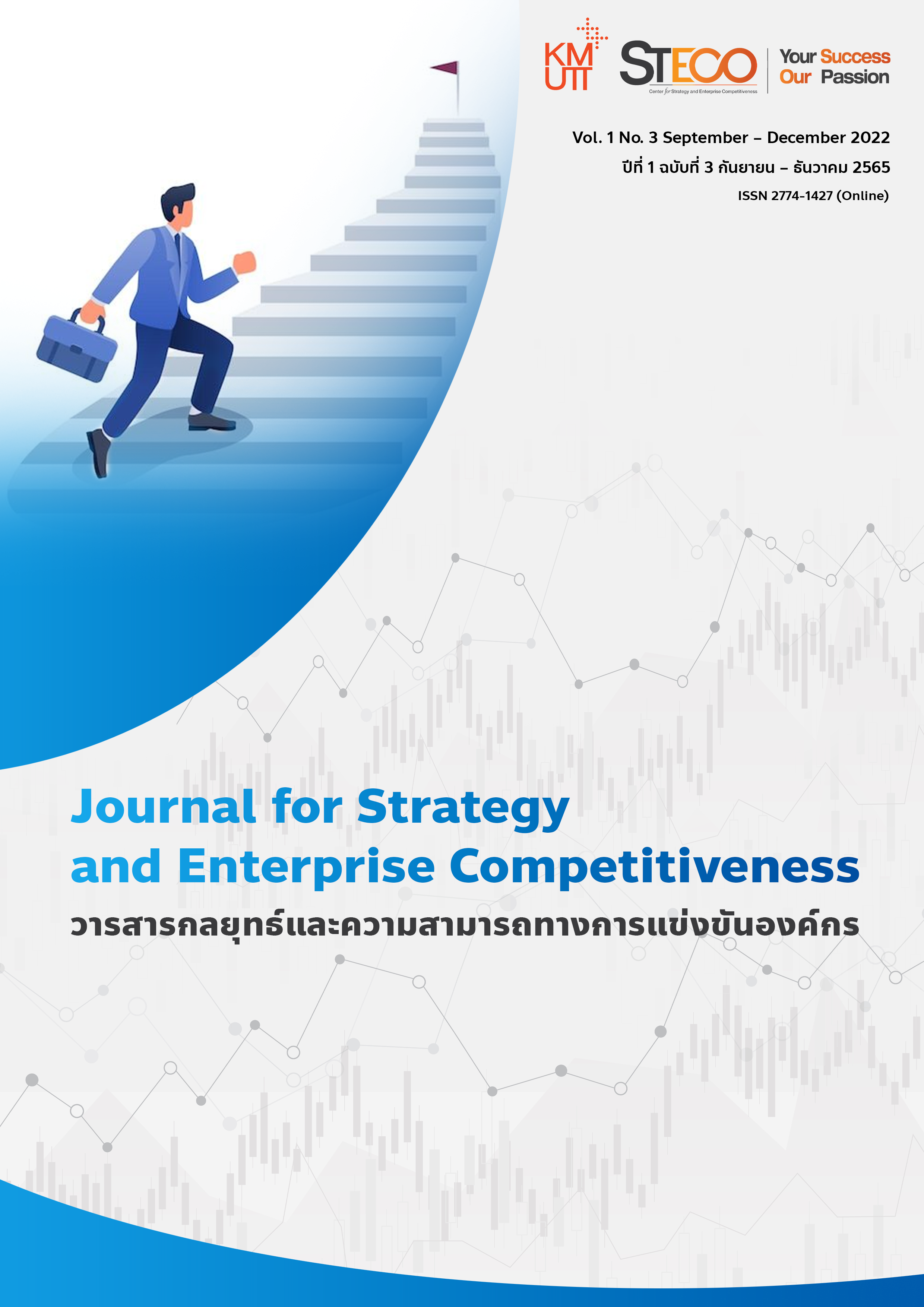ชีวิตดิจิทัลในประเทศไทย
คำสำคัญ:
ชีวิตดิจิทัล, ดัชนีชีวิตดิจิทัล, เศรษฐกิจดิจิทัลบทคัดย่อ
ชีวิตดิจิทัล (Digital Life) เป็นการดำเนินกิจกรรมประจำวันผ่านอุปกรณ์ (Device) ที่เป็นสิ่งอำนวยความสะดวกในการจัดการกิจกรรมต่างๆ ไม่ว่าจะเป็นการติอต่อสื่อสาร การทำงาน การประชุม การเรียนการสอน การทำธุรกรรมการเงิน การซื้อของ การหาข้อมูล ตลอดจนการใช้เพื่อความบันเทิงต่างๆ โดยในการศึกษาชีวิตดิจิทัลในประเทศไทยครั้งนี้เป็นการศึกษาข้อมูลผ่านการสัมภาษณ์ผู้เชี่ยวชาญที่เกี่ยวข้องกับเทคโนโลยีดิจิทัลในประเทศไทยทั้งภาครัฐและภาคเอกชนจำนวน 6 ท่าน ที่ได้ให้นิยามและองก์ความรู้ที่เกี่ยวกับชีวิตดิจิทัลที่ใกล้เคียงกับประชาชนชาวไทยมากที่สุด หากเราสามารถนำกิจกรรมประจำวันที่เราทำผ่านโลกของดิจิทัลนี้ไปพัฒนาต่อยอดให้เกิดประโยชน์ไม่ว่าจะเป็นการนำเอาความถี่หรือข้อมูลการใช้งานของแอพพลิเคชั่นที่แต่ละบุคคลถูกบันทึกไว้ในมือถือส่วนบุคคลนั้น จะพบว่าแต่ละบุคคลมีการใช้กิจกรรมที่ไม่เหมือนกัน บางคนใช้แอพพลิเคชั่นจำพวก Entertainment มากที่สุด บางคนใช้ Social Media มากที่สุด บางคนใช้ทำงานหรือประชุมมากที่สุด สิ่งเหล่านี้สามารถนำมาต่อยอดในการพัฒนาซอฟต์แวร์เพื่อตอบสนองผู้ใช้งานในอนาคตได้ หรือแม้กระทั่งหากในอนาคตการตรวจสอบ การคิดผลิตภัณฑ์ประกันสุขภาพของคนในยุคดิจิทัล ข้อมูลการนอนหลับพักผ่อน การเดินการวิ่ง การออกกำลังกาย สามารถนำมาให้เกิดประโยชน์การซื้อประกันสุขภาพ การให้ส่วนลดในการซื้อแพคเกจประกันสุขภาพ หรือการให้ข้อมูลการใช้มือถือเป็นส่วนหนึ่งของการประเมินอาการของผู้ป่วย การประเมินหรือการรักษาทางไกลของคุณหมอผ่านช่องทางออนไลน์ รวมถึงการพัฒนาในด้านสาธารณสุขของจักษุแพทย์ เป็นต้น
เอกสารอ้างอิง
Chachula, M. W. (2007). Digital Mobility-an Architecture for the Digital Lifestyle (Doctoral dissertation, University of Cincinnati).
Chantorn, K., and Chasuwan, S. (2022). The Educational Institute Administration in a VUCA World Digital Intelligence (DQ). Global Goals, Local Actions: Looking Back and Moving Forward 2021 (pp. 1002-1010). Suan Sunandha Rajabhat University.
Charmonman, S., and Chorpothong, N. (2005). Digital lifestyle and the road ahead. International journal of the computer, the internet and management, 13(3), 2-2.
Chimphlee, W., Saengrungrueang, T., Mutchima, P., and Netwong, T. (2021). Development of Smart Canteen in The New Normal Era: Digital Technology for Social Innovation. Journal of science and Technology, Ubon Ratchathani University, 23(1), 91-102.
Farmer, L., and Safer, A. M. (2010). Developing California school library media program standards. School Library Research, 13.
Guillermo Kopp and Mark Sievewright. (2020). Digital Payments. Digital Life, 8.
Kraiwanit, T. (2021). Technology in Digital Era: Definition of Digital Era Digital Economy. Rangsit University, 2-4.
Laorach, C. (2021). Digital transformation and Impacts to Organization. Journal of Human Sciences, 22(1), 227-240.
Ma, W. W. (2019). Small-Town Youths, Digital Lifestyle and Sustainable Urbanization. Digital Debates, 78.
McMahon, M., and Pospisil, R. (2005). Laptops for a digital lifestyle: Millennial students and wireless mobile technologies. Proceedings of the Australasian Society for Computers in Learning in Tertiary Education, 2, 421-431.
Pansri, T., and Chomtohsuwan, T. (2019). Digital life inequality in Thailand. Institute of economics, Rangsit University.
Papp-Danka, A. (2019). Digital lifestyle–digital citizenship–digital pedagogy. Opus et Educatio, 6(4).
Prensky, M. (2004). The emerging online life of the digital native. Retrieved August, 7(2008), 253-263.
Ramos-Soler, I., López-Sánchez, C., and Quiles-Soler, C. (2021). Nomophobia in teenagers: digital lifestyle, social networking and smartphone abuse.
Sinthuwongsanont, M. (2019). Student quality of life for learning management in digital age. Academic Journal of Mahamakut Buddhist University Isan Campus (Saeng Isan), 16(1), 277-293.
Tyutyuryukov, V., and Guseva, N. (2021). From remote work to digital nomads: tax issues and tax opportunities of digital lifestyle. IFAC-PapersOnLine, 54(13), 188-193.
Waitayapanich. R., Soopunyo. W., and Keeratiburana, Y. (2020). Strategy Development Process to Promote Lifelong Learning on Digital Literacy. UMT POLY Journal, 17(1), 437-445.
Yanopas. N. (2018). Digital Tourism Innovation. Journal of Kanchanaburi Rajbhat University, 7(2), 148-157.
ดาวน์โหลด
เผยแพร่แล้ว
รูปแบบการอ้างอิง
ฉบับ
ประเภทบทความ
สัญญาอนุญาต
ลิขสิทธิ์ (c) 2022 วารสารกลยุทธ์และความสามารถทางการแข่งขันองค์กร

อนุญาตภายใต้เงื่อนไข Creative Commons Attribution-NonCommercial-NoDerivatives 4.0 International License.
ข้อคิดเห็นที่ปรากฏและแสดงในเนื้อหาบทความต่าง ๆ ในวารสารกลยุทธ์และความสามารถทางการแข่งขันองค์กร ถือเป็นความเห็นและความรับผิดชอบโดยตรงของผู้เขียนบทความนั้น ๆ มิใช่เป็นความเห็นและความรับผิดชอบใด ๆ ของศูนย์กลยุทธ์และความสามารถทางการแข่งขันองค์กร มหาวิทยาลัยเทคโนโลยีพระจอมเกล้าธนบุรี
บทความ ข้อมูล เนื้อหา และรูปภาพ ฯลฯ ในวารสารกลยุทธ์และความสามารถทางการแข่งขันองค์กร ถือเป็นลิขสิทธิ์เฉพาะของศูนย์กลยุทธ์และความสามารถทางการแข่งขันองค์กร มหาวิทยาลัยเทคโนโลยีพระจอมเกล้าธนบุรี หากบุคคลหรือหน่วยงานใดต้องการนำทั้งหมดหรือส่วนหนึ่งส่วนใดไปเผยแพร่ต่อหรือเพื่อกระทำการใด ๆ จะต้องได้รับอนุญาตเป็นลายลักษณ์อักษรจากศูนย์กลยุทธ์และความสามารถทางการแข่งขันองค์กร มหาวิทยาลัยเทคโนโลยีพระจอมเกล้าธนบุรีก่อนเท่านั้น



